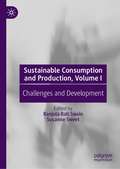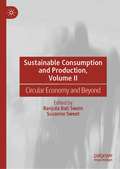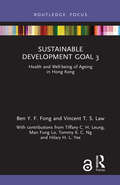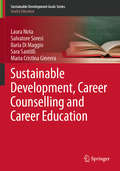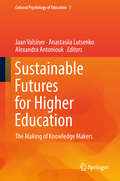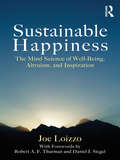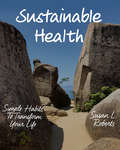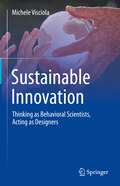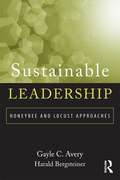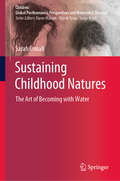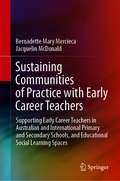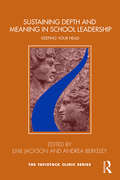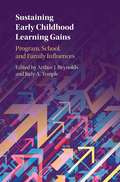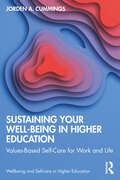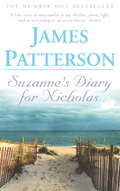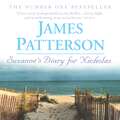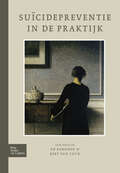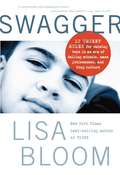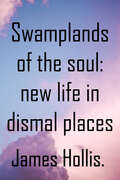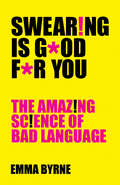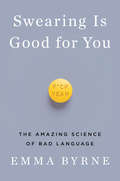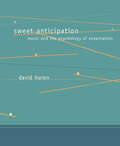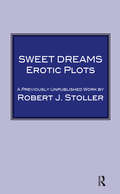- Table View
- List View
Sustainable Consumption and Production, Volume I: Challenges and Development
by Ranjula Bali Swain Susanne SweetEconomic growth and increasing population impose long-term risks to the environment and society. Approaches to address the impact of consumption and production on bio-diversity loss, resource availability, climate change, and mounting waste problems on land and in seas have yet not proven to be successful. This calls for innovative approaches to address the complex environmental, social, and economic interrelationships that have to be addressed in transforming to sustainable development. Sustainable Consumption and Production, Volume I: Challenges and Development aims to explore critical global challenges and addresses how consumers, producers, the private sector, international organizations, and governments can play an active role in innovating businesses to support a transitioning towards sustainable consumption and production. The book explores different approaches and innovations to address sustainable consumption and production. It details multiple social and economic contexts to the challenges and developments towards a sustainable consumption and production. The book is of interest to economists, students, businesses, and policymakers.Chapter 14 and chapter 15 are available open access under a Creative Commons Attribution 4.0 International License via link.springer.com.
Sustainable Consumption and Production, Volume II: Circular Economy and Beyond
by Ranjula Bali Swain Susanne SweetCircular economy principles are driving to overcome the challenges of today’s linear take-make-dispose production and consumption patterns through keeping the value of products, materials, and resources circulating in the economy as long as possible. Sustainable Consumption and Production, Volume II: Circular Economy and Beyond aims to explore the sustainable consumption and production transition to a circular economy, while addressing critical global challenges by innovating and transforming product and service markets towards sustainable development. This book explores how consumers, private sector, relevant international organizations, and governments can play an active role in innovating businesses to help companies, individuals (consumers and citizens), organizations, and sectors, to remain competitive, while transitioning towards sustainable markets and economies. It is of interest to economists, students, businesses, and policymakers.
Sustainable Development Goal 3: Health and Well-being of Ageing in Hong Kong (Routledge Focus on Public Governance in Asia)
by Ben Y. Fong Vincent T. LawSustainable Development Goals (SDGs) aim to develop a better and sustainable future for the world, and the goals are part of an action plan to address poverty, hunger, health, gender equity and various pressing world issues. One of these goals looks at health and wellness. Ageing populations have become a crucial issue worldwide, and this short monograph explores ageing and how the consequences of an ageing population may affect our healthcare system through a case study on Hong Kong’s population. The book looks at several critical health issues related to ageing. The elderly, particularly those with low socio-economic status, rely more on acute-centric care rather than primary care. The book suggests that secondary care service may only be effective to a limited extent as a healthcare measure and an optimum healthcare system should be one that focuses on primary care. The authors put forth a compelling argument for disease prevention and screening schemes and explain how they are more cost-effective and beneficial to society and the system. This thoughtful book will provide beneficial insights into the relationship of ageing and Sustainable Development Goals in the context of health and wellness for policymakers and healthcare professionals. The Open Access version of this book, available at http://www.taylorfrancis.com, has been made available under a Creative Commons Attribution-Non Commercial-No Derivatives 4.0 license.
Sustainable Development, Career Counselling and Career Education (Sustainable Development Goals Series)
by Laura Nota Salvatore Soresi Ilaria Di Maggio Sara Santilli Maria Cristina GinevraThis book is based on the Life Design paradigm and discusses the efforts made to overcome the matching paradigm between individuals and their work contexts, in order to guarantee the adoption of an active role for future career planning. Starting from the evolution of career counselling and vocational guidance in the 20th century and then following the more updated reflections in the Life Design paradigm, this book discusses research results from the Larios Laboratory (Padova, Italy) in collaboration with numerous international colleagues and institutions. These results show that career counselling and vocational designing can not only help people to plan their future in agentive ways, but also to help them getting out of the ‘mists of the present’ and to project themselves into a future that is yet to be created. This future is aligned by the world of research and international institutions, such as the UN and WHO, and follows the 2030 Agenda for Sustainable Development, with particular attention to Sustainable Development Goals 4, 8 and 12. This book reveals how trajectories can be created from one’s own mission, realized with the help of others and newly acquired strengths. It shows how career counselling and vocational designing can help people to build their own future from an inclusive and sustainable perspective, based on social justice, and to help build a better future for all.
Sustainable Futures for Higher Education: The Making of Knowledge Makers (Cultural Psychology of Education #7)
by Jaan Valsiner Anastasiia Lutsenko Alexandra AntonioukThis volume addresses the current situation in higher education and what creative action needs to be taken for the future development of the various systems of higher education. Higher education in the 21st centuries is under immense pressure from various sides. First, there is dramatic limitation of funding from public sources and limited and selective funding support from private sources that is re-constructing the landscape of higher education in most societies around the World. Secondly there is the continuous stream of administrative re-organization efforts of political origins (e.g. “the Bologna process”) that guide the advancement of higher education in our present time. Increasing privatization of all forms of higher education—from bachelor to doctoral levels—and its corresponding focus on the advancement of the kind of knowledge that has immediate applicability in various spheres of societies leads to the question- what kind of creativity is expected from the new cohorts of students—future makers of knowledge—once the current social re-organization of higher education systems becomes fully established. To address these questions the international, interdisciplinary cast of authors in this volume provides a multitude of possible scenarios for future development of the systems of higher education. This book on “Sustainable Futures of Higher Education” captures the current trends and perspectives of the Knowledge Makers from various nations of the world on meeting and greeting the challenges of globalization and the pressures of the knowledge economy. It makes a strong case for universities of tomorrow sustaining their autonomous thinking and yet nurturing an environment of collaborative partnership with society, corporate and industry to fuel innovations in plenty and continuous supply of new science and technologies. Higher Education has been and shall remain a powerful vehicle of national and global transformation. I see a great value of the publication in impacting the minds of the leaders in higher education around the globe for revitalizing the universities.Professor P. B Sharma, President of Association of Indian Universities, AIU How should the higher education system be in the globalization era? In this book Jaan Valsiner and his colleagues analyze, criticize the existing and propose a new higher education system. When we say "higher education”, three different layers are supposed to be there-- the lower, the middle and the higher. The latter has the function of production of new knowledges. Without new knowledge, our societies are never improving. Authors warn commercialized systems such as the “Bologna system” overestimate the homogeneity of education. ““Universities without Borders” would guarantee both diversity and innovation in the higher education systems.Professor Tatsuya Sato, Dean of Research, Ritsumekan University
Sustainable Happiness: The Mind Science of Well-Being, Altruism, and Inspiration
by Joe LoizzoToday’s greatest health challenges, the so-called diseases of civilization—depression, trauma, obesity, cancer—are now known in large part to reflect our inability to tame stress reflexes gone wild and to empower instead the peaceful, healing and sociable part of our nature that adapts us to civilized life. The same can be said of the economic challenges posed by the stress-reactive cycles of boom and bust, driven by addictive greed and compulsive panic. As current research opens up new horizons of stress-cessation, empathic intelligence, peak performance, and shared happiness, it has also encountered Asian methods of self-healing and interdependence more effective and teachable than any known in the West. Sustainable Happiness is the first book to make Asia’s most rigorous and complete system of contemplative living, hidden for centuries in Tibet, accessible to help us all on our shared journey towards sustainable well-being, altruism, inspiration and happiness.
Sustainable Health: Habits To Transform Your Life
by Susan L. RobertsSimple practices—a marriage of science and spirituality—that will help you take charge of your health. Ancient healers understood the universe as an interconnected conscious relationship between natural elements. As Western medicine took hold, we lost our sense of intuitive healing and practices. Here, occupational therapist Susan L. Roberts—who also has a degree from Harvard Divinity School—gives us tools for self-care based on the five-element theory of traditional Chinese medicine. These elements—fire, earth, wood, metal, and water—can also be linked to contemporary science and the elements of energy, matter, time, and space. Through focus on these elements, readers will learn how to impact tangible experiences of living, such as sleeping, eating, working, and understanding one’s own body. Roberts argues that our bodies communicate with the world, and that symptoms we may experience, such as headaches or exhaustion, can be mitigated by tapping into our ability to take care of ourselves—the essence of sustainable health.
Sustainable Innovation: Thinking as Behavioral Scientists, Acting as Designers
by Michele VisciolaThis book puts forward a new paradigm to understand and implement Sustainable Innovation (SI). Innovation without sustainability leaves out large swathes of the population or generates maladaptive or misappropriate behaviors. Innovative solutions will be sustainable if they can retain individual and group differences while offering greater benefits for the common good. When working together, designers, life, human and social behavioral scientists can add value, which promotes behavioral changes to the advantage of sustainable models in all fields. This volume presents a guide on how to set up sustainable innovation programs, as well as ideas on how to integrate multidisciplinary teams into innovation projects. Moreover, this book offers students a synthesis of non-academic thinking on the relationship between design and behavioral science.
Sustainable Leadership: Honeybee and Locust Approaches
by Gayle C. Avery Harald BergsteinerThe business case for operating along sustainable principles is becoming very clear. Sustainable organizations outperform their peers on many criteria, including corporate social responsibility, employee satisfaction and – surprising for some – even financially. Sustainable Leadership: Honeybee and Locust Approaches presents an evidence-based view of how 23 leadership practices facilitate outcomes that go beyond what is commonly referred to as the triple bottom line – environmental sustainability, corporate social responsibility and financial success. The book centers on a powerful metaphor of honeybee and locust behaviors, which illustrate two leadership philosophies with very different outcomes for a business and its viability. Gathering evidence from scholars combined with observations from successful firms around the world, the book presents a bundle of principles, behaviors and beliefs that forms a sustainable leadership system. This engaging, insightful book offers a set of principles that can be adapted in many ways to underpin sustainable leadership in different situations. It provides evidence and a rationale for building a business case to change towards more sustainable practices.
Sustained Dialogue in Conflicts
by Harold H. SaundersCitizens in our deeply, angrily divided world desperately need peaceful and productive ways of relating to each other. Rooted in four decades of intense experience in deep-seated human conflicts, Saunders presents a peaceful way of transforming destructive relationships and designing change.
Sustaining Childhood Natures: The Art of Becoming with Water (Children: Global Posthumanist Perspectives and Materialist Theories)
by Sarah CrinallThis book examines sustainability learning with children, art and water in the new material, posthuman turn. A query into how we might sustain (our) childhood natures, the spaces between bodies and places are examined ontologically in daily conversations. Regarding philosophy, art, water and her children, the author asks, how can I sustain waterways if I am not sustaining myself?Theoretically disruptive and playful, the book introduces a new philosophy that combines existing philosophies of the new material and posthuman kind. The ecological sciences, and the arts, are drawn together / apart to help recognize sustainability in its emergent, relational form. All the while this book, as art, engages and flows over the reader – as such, reading it becomes a transformative, meditative experience. Daily rhythms of ‘being-with’ art, water and children take the reader beyond orientations of environmental education that focus on notions of lack and reduction. New possibilities for sustaining childhood natures – for what is becoming, and unbecoming – emerge here in the making processes of an academic, everyday life in early motherhood.
Sustaining Communities of Practice with Early Career Teachers: Supporting Early Career Teachers in Australian and International Primary and Secondary Schools, and Educational Social Learning Spaces
by Bernadette Mary Mercieca Jacquelin McDonaldThis book focuses on sustaining communities of practice in primary and secondary schools in Australia and internationally for the professional learning of all teachers, and particularly, early career teachers. Informed by the communities of practice research of Wenger-Trayner, it shows what factors are conductive to the sustainability of communities of practice, drawing particularly on a case study of an Australian regional secondary school, and explores how it has sustained support particularly for early career teachers over a three-year period.The first chapters of the book provide longitudinal perspectives using qualitative data and include perspectives from a variety of stakeholders, including the principal, the professional learning coordinator and the early career teachers who have experienced the school’s Communities of practice over three or more years. It offers practical suggestions on how to implement and improve communities of practice in schools and highlights the increasing importance of online communities to support early career teachers. Policy-makers, school principals, teacher educators and teaching practitioners find the book useful for implementing and sustaining communities of practice in schools.Subsequent chapters explore the value of online communities, such as Twitter communities; the role of collegial support networks in supporting early career teachers in Flemish primary education; and professional learning in Northern Ireland pre- and in-service teacher networked communities.
Sustaining Depth and Meaning in School Leadership: Keeping Your Head (Tavistock Clinic Series)
by Emil JacksonSustaining Depth and Meaning in School Leadership: Keeping Your Head concerns the emotional and psychological experience of school leadership—in particular, the felt experience of life as a headteacher. It describes the pressures and rewards of the role, together with some of the ways that school leaders successfully sustain and develop themselves and their teams in what has become an increasingly complex, challenging, and highly accountable role. This book explores the personal experience of leading schools. Part I provides an overview and analysis of current and historical trends in school leadership and offers some theoretical frameworks for making sense of these. Part II then offers psychodynamic approaches to supporting and developing school leaders and the impact that trends in executive education continue to have on this. Part III looks at approaches to school leadership development more generally, including team development; influences from the business world; the growth of mentoring and coaching as a leadership intervention; the design and evaluation of leadership development programmes; and a case study on whole-system development. The final word is given to ten serving headteachers and deputies and their leadership journeys. This range of chapters, concepts, and perspectives will support school leaders to maintain an emotional equilibrium while navigating the multilayered tightrope of intrapsychic, interpersonal, and organizational dynamics inherent in school life. Rooted in Jackson and Berkeley’s belief that school leaders are likely to be at their best when they find their own unique and authentic way of taking up their leadership role, this book is an accessible, supportive, and developmental contribution for all those involved in education leadership.
Sustaining Early Childhood Learning Gains: Program, School, and Family Influences
by Arthur J. Reynolds Judy A. TempleHow gains from early childhood experiences are initiated, increased, sustained, and affect life-course development are fundamental to science and society. They also have increasing policy relevance, given public investments in early learning programs and the need to measure their effectiveness in promoting well-being. With contributions from leading researchers across many disciplines, this book emphasizes key interventions and practices over the first decade of life and the elements and strategies through which gains can be enhanced by schools, families, communities, and public institutions. Three critical themes are addressed: firstly, the importance of documenting and understanding the impact of investments in early childhood and school-age years. Secondly, increased priority on elements and principles for scaling effective programs and practices to benefit all children. Thirdly, a focus on multiple levels of strategies for sustaining gains and promoting long-term effects, ranging from early care and family engagement to school reform, state, and federal policy.
Sustaining Your Well-Being in Higher Education: Values-Based Self-Care for Work and Life (Wellbeing and Self-care in Higher Education)
by Jorden CummingsThis book provides an evidence-based approach to sustainable self-care, anchoring these strategies in individual academic workers’ core personal values. It teaches readers how to use their values to leverage self-care strategies into a workable, individualized, and effective map to wellness.Working in the demanding environment of higher education can leave little time for self-care, yet making space for wellness and self-care is essential to creating a creative and innovative environment for academic work. This book shows how to create and successfully implement realistic self-care plans. By identifying core values and using these to develop individualized self-care plans, Sustaining Your Well-Being in Higher Education pushes back against a one-size-fits-all approach while also discussing the role of self-care in academic labor activism and providing strategies for readers to become advocates for better self-care practices within their zones of influence.Designed to provide academic workers with the skills they need to develop workable and sustainable self-care plans, this book is an invaluable resource for students and professionals working in all areas of higher education.
Suzanne's Diary for Nicholas
by James PattersonKatie Wilkinson has found the perfect man at last - but one day he disappears from her life, leaving behind only a diary for her to read. The diary was written by a new mother, as a keepsake for her baby son. In it she touchingly recounts the initial romance between herself and the child's father, and the unparalleled joy that motherhood has brought her. As Katie reads this moving account, it becomes clear that the lover who has left her is the same man as the husband and father in the diary. She reads on, filled with terror and hope as she struggles to understand what has happened - and whether her new love has a prayer of surviving.
Suzanne's Diary for Nicholas
by James PattersonBook editor Katie is in love with poet, Matt Harrison. He seems to share her feelings, but refuses to talk about his past. All she knows is that Matt was once married. One evening, he suddenly ends their relationship, leaving Katie devastated. A few days later, he sends her a notebook that he promises will explain everything. Katie opens the book to find it is the diary that Matt's wife, Suzanne, wrote for their baby son. It tells the story of her love for Matt and Nicholas, and reveals the tragedy that haunts Matt's life today. And Katie realises he needs her to understand his past if she is ever to be a part of his future.(P)2013 Headline Digital
Suïcidepreventie in de praktijk
by A.J.F.M. Kerkhof and J.B. LuynNederland kent internationaal gezien een laag suïcidecijfer, namelijk 1.500 suïcides per jaar. Toch is elke suïcide er een te veel. Met dit boek willen de auteurs een bijdrage leveren aan de terugdringing van suïcides. Suïcidepreventie in de praktijk richt zich primair op wat je moet doen: welke vragen stel je, hoe stel je ze, wanneer en aan wie, hoe zorg je voor continuïteit, waar moet je op letten etc. De onderwerpen variëren van de onderkenning van suïcidale jongeren op school tot de behandeling van de chronisch suïcidale patiënt. Er worden preventief georiënteerde programma’s beschreven, handvatten geboden voor de opvang van suïcidepogers in het ziekenhuis en crisisinterventie, maar ook de hulp aan nabestaanden van een suïcide komt aan bod. Ook besteden de auteurs aandacht aan specifieke groepen zoals verslaafden, mensen met een persoonlijkheidsstoornis en ouderen met een doodswens. Daarnaast behandelen zij praktische methoden als cognitief-gedragstherapeutische interventies, interventies vanuit de dialectische gedragstherapie en de aanpak van dwangmatig piekeren over zelfdoding. Dit praktijkboek bevat vele gevalsbeschrijvingen.
Swagger: 10 Urgent Rules for Raising Boys in an Age of Failing Schools, Mass Joblessness, and Thug Culture
by Lisa Bloom“At this very moment, through no fault of their own, our boys are caught in the vortex of four powerful, insidious, often invisible forces which conspire to rob them of their future.” -- From the introduction. We medicate, discipline, suspend and expel our boys from school at quadruple the rate of girls. We let double the number of boys drop out of high school than girls, and those boys who do graduate are far more likely than their sisters to be illiterate, to fail to go to college, or to drop out of college if they do go. SWAGGER is a wake up call for parents about the real world our boys inhabit, but it offers solutions as well. From how to teach your boy humility, to “making your home a reading mecca,” and creating an expectation of college graduation, this book is packed with research-proven, parent-tested, teacher-approved practical solutions. --Why is your son struggling in school? -- Why can’t teenage boys find jobs? -- How does our media get away with messages that being a man means being a thug? -- Why are our prisons overflowing with young men? -- And how can we protect our boys and give them the bright future they deserve? New York Times bestselling author, attorney, and mother Lisa Bloom answers these questions in her passionate, no-nonsense style. Swagger reveals the forces aligned against our sons, then offers ten practical, inexpensive, proven solutions for raising healthy sons, starting today.
Swamplands of the Soul: New Life in Dismal Places
by James HollisArguing that the pursuit of happiness is futile, the Jungian perspective asserts that the goal of life is not in happiness, but in meaning which is real, rather than a fruitless ideal. This book shows how to find life's dignity by uncovering its deepest meaning and discovering errors made.
Sway: The Irresistible Pull of Irrational Behavior
by Ori Brafman Rom BrafmanWhat makes people act irrationally? This brilliant book shows how people do things against their best interests.
Swearing Is Good For You: The Amazing Science of Bad Language
by Dr. Emma ByrneIn the vein of The Man Who Mistook His Wife for a Hat comes a fascinating and fun look at the new science of bad language.Did you know that chimpanzees can swear? Or that we do most of our swearing in our first language? Have you ever noticed that swearing is an excellent painkiller? In delightfully fun and accessible language, backed by riveting historical case studies and the latest cutting-edge research, Dr. Emma Byrne explores the science behind swearing and why bad language might actually be good for us. Swearing, it turns out, is socially and emotionally essential. Not only has some form of swearing been around since the earliest humans began to communicate, but it has been shown to reduce physical pain, prevent violence, help stroke victims recover their language, and help people work together as a team. Swearing Is Good For You is a fascinating and fun look at the new science of bad language.
Swearing Is Good for You: The Amazing Science Of Bad Language
by Emma ByrneAn irreverent and impeccably researched defense of our dirtiest words. We’re often told that swearing is outrageous or even offensive, that it’s a sign of a stunted vocabulary or a limited intellect. Dictionaries have traditionally omitted it and parents forbid it. But the latest research by neuroscientists, psychologists, sociologists, and others has revealed that swear words, curses, and oaths—when used judiciously—can have surprising benefits. In this sparkling debut work of popular science, Emma Byrne examines the latest research to show how swearing can be good for you. With humor and colorful language, she explores every angle of swearing—why we do it, how we do it, and what it tells us about ourselves. Not only has some form of swearing existed since the earliest humans began to communicate, but it has been shown to reduce physical pain, to lower anxiety, to prevent physical violence, to help trauma victims recover language, and to promote human cooperation. Taking readers on a whirlwind tour through scientific experiments, historical case studies, and cutting-edge research on language in both humans and other primates, Byrne defends cursing and demonstrates how much it can reveal about different cultures, their taboos and their values. Packed with the results of unlikely and often hilarious scientific studies—from the “ice-bucket test” for coping with pain, to the connection between Tourette’s and swearing, to a chimpanzee that curses at her handler in sign language—Swearing Is Good for You presents a lighthearted but convincing case for the foulmouthed.
Sweet Anticipation: Music and the Psychology of Expectation (Bradford Bks.)
by David HuronThe psychological theory of expectation that David Huron proposes in Sweet Anticipation grew out of the author's experimental efforts to understand how music evokes emotions. These efforts evolved into a general theory of expectation that will prove informative to readers interested in cognitive science and evolutionary psychology as well as those interested in music. The book describes a set of psychological mechanisms and illustrates how these mechanisms work in the case of music. All examples of notated music can be heard on the Web.Huron proposes that emotions evoked by expectation involve five functionally distinct response systems: reaction responses (which engage defensive reflexes); tension responses (where uncertainty leads to stress); prediction responses (which reward accurate prediction); imagination responses (which facilitate deferred gratification); and appraisal responses (which occur after conscious thought is engaged). For real-world events, these five response systems typically produce a complex mixture of feelings. The book identifies some of the aesthetic possibilities afforded by expectation, and shows how common musical devices (such as syncopation, cadence, meter, tonality, and climax) exploit the psychological opportunities. The theory also provides new insights into the physiological psychology of awe, laughter, and spine-tingling chills. Huron traces the psychology of expectations from the patterns of the physical/cultural world through imperfectly learned heuristics used to predict that world to the phenomenal qualia we experienced as we apprehend the world.
Sweet Dreams: Erotic Plots
by Robert J. StollerA previously unpublished work by the author. 'It was like discovering a previously unknown recording by the Beatles. On a 2007 visit to the author's widow, Sybil, she handed me a manuscript. The author's last book had been placed in a publishing queue by his retiring editor. After Bob's death Sybil was told that the publisher had discontinued psychoanalytic books. It languished on a home shelf in Los Angeles for sixteen years. I was holding the final work by psychoanalysis's most eloquent writer on sex.' - From the Foreword by Dr Richard Green
